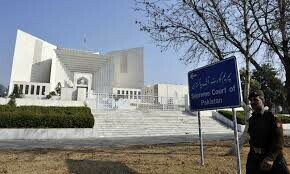KARACHI, Aug 27: The Sindh High Court has held that there is no constitutional bar to prevent a non-Muslim from becoming a judge of the High Court.
This has been held by a bench of the SHC which disposed of a constitutional petition in which, among other things, appointment of Justice Rana Bhagwandas was challenged.
The bench comprised Justice Zahid Kurban Alavi, Justice Shabbir Ahmed and Justice Ghulam Rabbani.
Petitioner M. Shafi Muhammadi, who is a practising advocate, through a constitutional petition (No D-412/1998), had prayed that the respondent had no authority to appoint any judge in violation of the Islamic points deduced in the judges case and/or to act on un-Islamic points in violation of the Qadiani’s case with reference to the points decided by the Federal Shariat Court (FSC).
It was his contention that the respondent had no authority to appoint Rana Bhagwandas, a Hindu, in violation of Islamic concept, otherwise it should be amounting to declare the Qadiani’s case to have been decided on self-made presumption.
It was also his contention that the respondent had no authority to appoint Ms Majida Rizvi, former judge of the High Court, to deal with each and every kind of case, including Hudood and Qisas cases.
The petitioner had also questioned the respondent’s authority to issue the notification dated September 30, 1996 to regularize the appointment of Justice Rana Bhagwandas, in violation of the Islamic concept or in violation of Verse 141 of Surah Al-Nisa of the Holy Quran or to regularize the appointment of former Justice Majida Rizvi, without clarifying that she could not sit over Hudood and Qisas cases.
It was also his prayer not to regularize the services of any judge already appointed in violation of the Islamic points which were highlighted in the Judges cases; to restrain Bhagwandas from working as judge of this Court; and to restrain retired Justice Majida Rizvi from sitting over the cases involving Hudood and Qisas matters.
The petitioner had further alleged that under the garb of the Judges case, Justice Sajjad Ali Shah (as he then was the chief justice of Pakistan) followed the first point to get persons of his own choice appointed in Sindh by ignoring the criteria which was set in “the Judges case; Rana Bhagwandas, J., was not confirmed by the government of Benazir Bhutto, like other judges, but was got confirmed by the chief justices concerned after the Judges case as per notification dated 30.9.1996. A question arises whether Rana Bhagwandas, J., a Hindu, who is not a Muslim by his own belief, can keep the sacred book of the Holy Quran in his hand particularly in the light of the judgment in the Qadiani’s case who claim to be Muslims but are not treated as Muslims by any other Muslim sect in Pakistan, and the government has failed to treat the appointment of Bhagwandas to be un-Islamic, illegal and unconstitutional because he would have no right to keep the Holy Quran in his hands to decide cases in accordance with the Islamic principles.
It was also the petitioner’s contention that to some extent the appointment of former justice Majida Rizvi also fell within the ambit of certain important points which were not disputed by different Muslim jurists.
It was further urged in the petition that Bhagwandas’s appointment as a judge of the SHC was against the provisions of the Constitution of the Islamic Republic of Pakistan, he being not qualified to be a judge, all his decisions from the date of appointment as judge of the SHC were void without jurisdiction, hence corum non judice and he was again guilty of misconduct. His appointment and the notification issued in this regard were both void and invalid.
After hearing counsel, the bench held that article 193 of the constitution dealt with the appointment of High Court Judges. There was no bar specifically mentioned in the articles which would prevent a non-Muslim from becoming a judge of the High Court.
In fact, the bench held, under article 203-A qualification as regards a judge of the FSC was concerned, it was clearly mentioned that a person should be an Aalim well versed in the knowledge of Shariah. The constitution also specifically mentioned Muslim judges, therefore it would be logical to conclude that a non-Muslim could not be a judge of the FSC. There was no such bar or a specific mention that there had to be a Muslim judge in respect of the High Court.
In the judgment authored by Justice Zahid Kurban Alavi, the bench was also of the view that various Fiqhs and observations of most of scholars, especially in respect of the qualifications of a Qazi did acknowledge that all services would be open to Muslims and non-Muslims alike. There was definite emphasis on the fact that for a Qazi to sit and adjudicate on a dispute requiring interpretation of Shariah it would be necessary for the Qazi to be not only well versed in the knowledge of Islam, but also he should have full faith in the religion.
Justice Alavi observed that it would be appropriate to note that wherever the makers of the constitution had intended to debar a non-Muslim from holding any public office then explicit and specific provision to that effect had been incorporated in the constitution.
“We have no authority or power to pass a restraining order against a judge of the Supreme Court,” held the bench.















































Dear visitor, the comments section is undergoing an overhaul and will return soon.